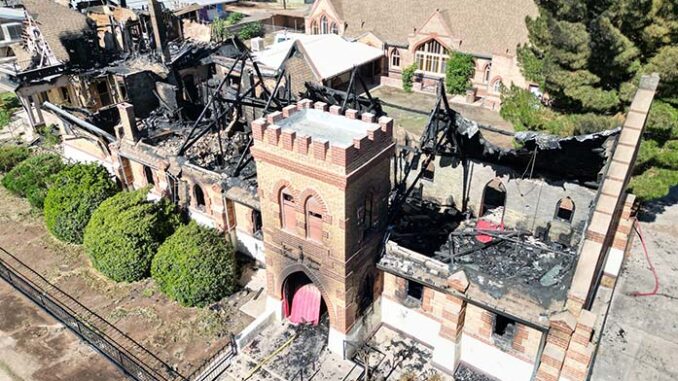[ad_1]

A Douglas man accused by federal agents of intentionally setting fire to two historic churches last month must remain in the custody of the U.S. Marshal Service until a judge can conduct a dangerousness hearing next week.
Eric Duane Ridenour was arrested May 22 following a joint investigation led by Bureau of Alcohol, Tobacco, Firearms and Explosives (ATF) into the fiery destruction of the St. Stephen’s Episcopal Church and the First Presbyterian Church earlier in the day. He is charged with violating federal law by maliciously destroying a building used in interstate commerce.
Ridenour, 58, has remained in custody awaiting a formal detention hearing at the Evo A DeConcini U.S. Courthouse in Tucson on June 15. The pretrial detention of defendants charged with federal crimes is governed by the Due Process Clause of the Fifth Amendment, the Excessive Bail Clause of the Eighth Amendment, and the Bail Reform Act of 1984.
The Bail Reform Act requires judges in most cases to consider the least restrictive condition or combination of conditions to reasonably assure a defendant’s appearance in court and the safety of others.
The charges against Ridenour stems from multiple 911 calls on the morning of May 22 reporting smoke and flames visible at St. Stephen’s Episcopal. As multiple firefighters struggled to control the fire, they received reports of a fire at First Presbyterian on the same block.
Both churches, which were built more than 100 years ago when Douglas was a booming mining town, were destroyed.
ATF special agents utilized video evidence from several local businesses to quickly identify a suspect description and a description of the suspect’s vehicle. Ridenour was arrested within hours and multiple items of evidence were seized from his home and vehicle as well as from the crime scene.
Court records show Ridenour had his initial court appearance on May 25 at which time Federal Magistrate Judge Bruce G. Macdonald ruled Ridenour would remain in custody pending a formal pretrial detention hearing.
The detention hearing was to take place May 31, but Pretrial Services advised Magistrate Judge Maria S. Aguilera that Ridenour twice refused to be interviewed, making it difficult to prepare a Pretrial Risk Assessment report. The report is designed in part to predict an individual’s risk of failure to appear, risk of committing a new offense prior to trial, and risk of violating pretrial release conditions.
Risk factors include a defendant’s prior felony convictions, prior failures to appear, the type of offense or offenses charged, and socioeconomic factors such as age, education level, employment status, substance abuse, home ownership, and citizenship.
Ridenour’s attorneys, Nancy J. Arce and Matei Tarail of the Federal Public Defenders Office in Tucson, promised at the May 31 hearing that their client would cooperate with the interview. It was then revealed the U.S. Attorney’s Office was seeking a dangerousness hearing in order to present evidence for Aguilera to consider.
Originally set for June 7, the dangerousness hearing was postponed for one week to allow “additional time to prepare including gathering potential evidence and/or proffers in advance of the hearing,” according to court records.
There are two main issues Aguilar must consider while balancing a defendant’s presumed innocence and constitutional right to freedom against the imperative of protecting others in the community.
The first is whether any release condition or combination of conditions will “reasonably assure” the defendant shows up for court hearings and trial. To support a no-pretrial release order, the U.S. Attorney’s Office must prove “by a preponderance of the evidence” that Ridenour is a flight risk and that no release conditions will ensure his presence.
The second issue Aguilar must consider is whether the government has established “clear and convincing evidence” that no conditions of release will reasonably assure the safety of the community.
The case is being prosecuted by Adam D. Rossi and Benjamin S. Goldberg of the U.S Attorney’s Office.
[ad_2]
Source link


